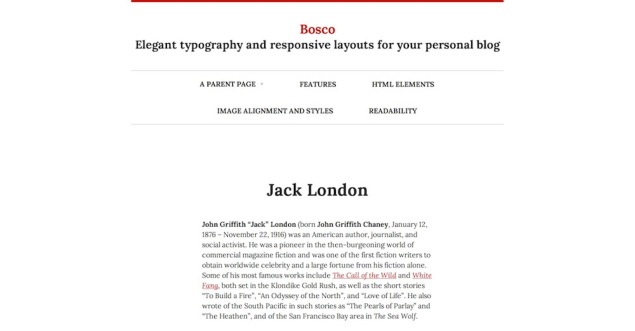We have a new free theme to announce today: Bosco!

Amid a sea of sliders, sidebars, and huge header images, Bosco stands alone in its refined focus on content.
Your story is presented in a centered, single column, with sophisticated typography and an adaptive layout that looks beautiful on any device, mobile or desktop. There’s still plenty of room for widgets in multiple sections above the footer, while Custom Menus, Custom Background support, and unique Post Format treatments prove that Bosco is anything but lacking in features.

Give your readers the distraction-free experience they deserve with Bosco. You can see it in action on the demo site, or activate it on your own blog at Appearance → Themes.
Filed under:
Themes 

Sarah Noonan, Intern
Yesterday David L. Bosco blogged for us about Obama’s speech in front of the UN General Assembly. Below is an excerpt from his new book, Five To Rule Them All: The UN Security  Council and the Making of The Modern World, which tells the inside story of this remarkable diplomatic creation, illuminating the role of the Security Council in the postwar world, and making a compelling case for its enduring importance. In the excerpt below we are introduced to the Security Council.
Council and the Making of The Modern World, which tells the inside story of this remarkable diplomatic creation, illuminating the role of the Security Council in the postwar world, and making a compelling case for its enduring importance. In the excerpt below we are introduced to the Security Council.
The Security Council is like no other body in history. Its five permanent members-China, France, Russia, the United Kingdom, and the United States-account for nearly 30 percent of the world’s population and more than 40 percent of global economic output. In military affairs, their dominance is even more overwhelming. They control more than 26,000 nuclear warheads, 99% of all those in existence. They have a combined 5.5 million men and women in arms. When the Council is united, its members can wage war, impose blockades, unseat governments, and levy sanctions, all in the name of the international community. There are almost no limits to the body’s authority.
The council usually meets in the UN headquarters complex on New York’s East River, but it has greater power and authority than the rest of the sprawling organization. The council is a creature of great-power politics, not international bureaucracy. It is built on the assumption that five of the strongest nations have the right and duty to safeguard the globe. Most of the UN structure insists that member states are equal; the council, by contrast, grants the most powerful countries special rights and responsibilities.
The idea that the great powers should chaperone the world is not new. Coalitions of powerful nations-including the Congress of Vienna and the Holy Alliance in the eighteenth and nineteenth centuries-have tried before. The Geneva-based League of Nations, inaugurated in 1920, was the world’s answer to the horror of the First World War. It constituted the first fully developed world political organization, and it had a council of major powers charged with preserving the peace. The league and its council died prematurely when they failed to prevent an even more devastating war, but the idea of a world organization endured.
During its almost seven decades of operation, the UN Security Council has launched a broad range of diplomatic, legal, and even military initiatives to provide order. Since the late-1980s, its activities have increased dramatically. The council has blessed armed interventions in places like Bosnia, Somalia, Haiti, and Kuwait. It has imposed sanctions on the regimes in Serbia, Libya, and Sudan; launched war crimes courts to try sitting heads of state; and targeted terrorist finances. During the Cold War, the United States usually felt comfortable exercising its military power without the council’s permission. No longer. Even the George W. Bush administration-with its deep skepticism of the United Nations-worked to get the council’s approval for its policies. For many, the 2003 U.S.-led invasion of Iraq demonstrated the perils of operating without the council’s blessing, and the body has emerged from the imbroglio active and relevant. In 2007, the council authorized peacekeeping missions that involved more than 100,000 troops from dozens of nations. From nuclear proliferation to the global war against terrorism to genocide in Africa, the council is often the cockpit for global politics.
Yet even the council’s vigorous post-Cold War activity has fallen well short of effective global governance. Atrocities and crimes against humanity still plague many parts of the globe. Entire countries have collapsed, and in so doing they have exported refugees, drugs, and radicalism. Since the 1980s, Pakistan, India, and North Korea have tested nuclear weapons while the council watched. These shortcomings have led to frequent and angry charges that it is feckless, impotent, and unprincipled. More than a few commentators have charged that the United Nations and its council are an impediment rather than an aid to world order.
The council’s new activism has stirred hopes that it will assure world order, stop atrocities, and counter global threats like terrorism and weapons proliferation. Yet it exists in a world of realpolitik. Its members are, above all, powerful states with their own diverging interests. Time and again, the council’s performance has dashed hopes that its members would somehow rise above their narrow interests and work together to establish a more peaceful and just world.

David L. Bosco is Assistant Professor in the School of International Service at American University. A graduate of Harvard Law School, he is a former Senior Editor at Foreign Policy and has been a political analyst and journalist in Bosnia and Herzegovina, and a deputy director of a  joint United Nations – NATO project in Sarajevo. His most recent book, Five To Rule Them All: The UN Security Council and the Making of The Modern World, tells the inside story of this remarkable diplomatic creation, illuminating the role of the Security Council in the postwar world, and making a compelling case for its enduring importance. In the original post below, Bosco reflects on Obama’s speech to the UN General Assembly today.
joint United Nations – NATO project in Sarajevo. His most recent book, Five To Rule Them All: The UN Security Council and the Making of The Modern World, tells the inside story of this remarkable diplomatic creation, illuminating the role of the Security Council in the postwar world, and making a compelling case for its enduring importance. In the original post below, Bosco reflects on Obama’s speech to the UN General Assembly today.
President Obama accomplished some important objectives in his speech to the UN General Assembly today. He emphasized how much has already changed under his administration, mentioning torture, Guantanamo, climate change, and Iraq in particular. But he also tried to to call the broader UN membership to task for what he called “reflexive anti-Americanism” and a tendency to always point at others when discussing international problems. As has often been the case internationally, the president is trying to both acknowledge American missteps but also convince the world to follow its lead.
Obama did some finger-pointing of his own. He identified Iran and North Korea as threats that might take the world down “a dangerous slope” of regional arms races and unchecked nuclear proliferation. He demanded that these countries face consequences if they continue to ignore the Security Council. But the language here was much more tempered than that used by President Bush in 2002 when he was trying to rally the world to confront Iraq. He did not even hint that the U.S. might work around the UN if that becomes necessary.
One notable absence in his speech: he did not mention reform of the Security Council, which has been a staple of other speeches at the General Assembly, particularly from developing world leaders. In general, the Obama administration has been quiet about the question of whether and how the Council should be expanded. It will be interesting to see whether he mentions the subject tomorrow, when he chairs a Council meeting on nonproliferation.






 Council and the Making of The Modern World
Council and the Making of The Modern World
Finally Free Themes! WOOO HOOO
Very nice theme but i prefer other ones, like Elegant Grunge or the theme i have now.
Obviously it’s only my personal opinion :)
Thanks for introducing Bosco. It’s looks like a clean and simple theme with features I need. Its easy to read fonts are appealing and the single column showcases content by eliminating sidebar distractions. I’ll be trying it out in my test blog.
I thought this was new! Just adopted it for my Writing 101 Challenge blog. Perfect for simplicity.
Bosco looks great. What matters to me more and more is having a theme that looks great on mobile devices.
Kind of excited! As a vintage typographer and graphic artist I’m breathless about the copy-photo-graphic layout features, the combination of a classic serif font within a smaller font-size and leading config’, and the simplistic elegance. Off to source where/how the sidebar material resides … to decide whether this can work as a literary person’s business platform.
Great theme! While I personally prefer a lot of customization, I’m gonna recommend this to a friend who is into minimalism.
I probably won’t be trying it out because I love my current theme, but I could recommend it to my friend, who loves themes like this.